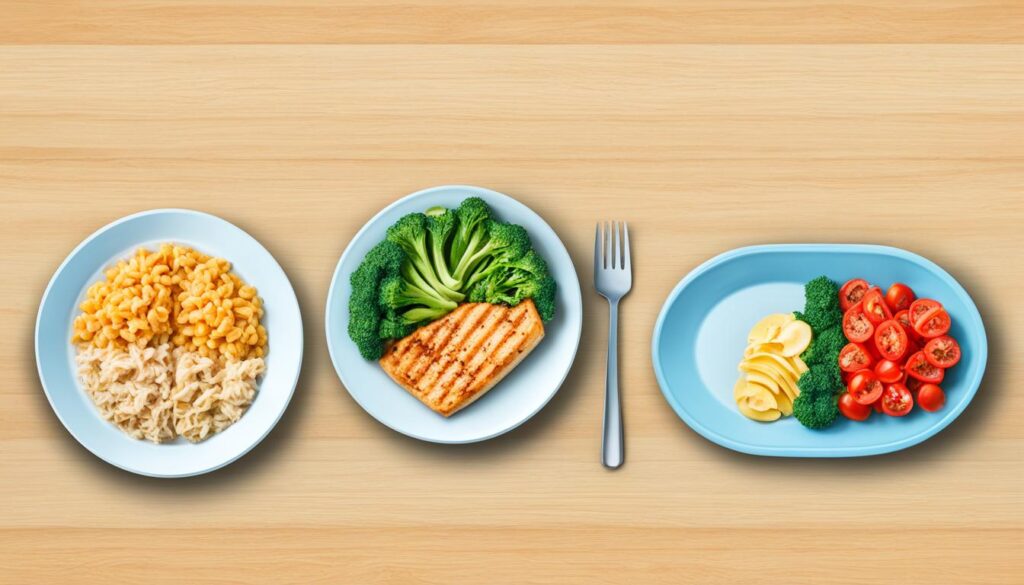Are you struggling to lose weight, but the number on the scale just won’t budge? The secret to overnight weight loss may lie in your sleep habits. Did you know that about 35% of US adults are sleeping fewer than 7 hours most nights according to the Centers for Disease Control and Prevention (CDC)1? This lack of sleep can have a significant impact on your weight and overall health.
A study showed that sleep deprivation led to significant increases in hunger, food cravings, portion sizes, and chocolate and fat intakes1. One review even found that those who experienced sleep deprivation consumed an additional 385 calories per day, with a greater proportion of calories coming from fat1. Lack of sleep may lead to poorer food choices, such as higher intake of foods high in calories, sugar, and fat1. Late-night eating is also associated with greater weight gain, higher BMI, and decreased fat oxidation1.
Key Takeaways
- Sleeping fewer than 7 hours per night can lead to weight gain and poor food choices.
- Sleep deprivation can increase hunger, food cravings, and calorie intake.
- Maintaining a regular sleep schedule is essential for weight management.
- Exercising regularly can improve sleep quality and duration.
- Reducing stress and creating a calming sleep environment can promote weight loss.
Eat an Early Dinner
Eating dinner several hours before bedtime can prevent bloating from the digestion process while you sleep2. This allows your body to focus on losing water and carbon weight overnight rather than trying to digest food2. In fact, research shows that eating dinner at 10 p.m. instead of 6 p.m. may result in peak blood sugar levels nearly 20% higher and a 10% reduction in fat burning2.
Numerous studies have found that having an early dinner, around 7-7:30 p.m., and going to bed by 10 p.m. can provide significant health benefits3. These advantages include improved sleep quality, weight loss, better digestion, increased energy, and reduced risk of chronic diseases like diabetes and heart disease3.
One study analyzed 20 healthy volunteers and found that late eaters had significantly higher blood sugar levels and reduced fat metabolism when compared to those who ate dinner earlier2. Additionally, the study involved detailed monitoring techniques and found that differences in individual responses to late meals were influenced by their usual sleep patterns2.
Further research has shown that people who have dinner within half an hour of sunset see even greater health benefits3. This includes improved sleep quality, weight loss, and reduced risk of certain types of cancer, such as prostate cancer in men and breast cancer in women3.
To maximize the benefits of an early dinner, consider having a small, high-protein snack in the late afternoon to potentially reduce the impact of a late dinner on your metabolism2. Cultivating healthy eating habits, including considering meal timing, may help reduce the risk of chronic diseases and support your overall health and well-being2.
Remember, the timing of your meals can have a significant impact on your metabolism and weight management. By eating an early dinner, you can take advantage of the many benefits that this simple habit can provide2.
Take an Epsom Salt Bath Before Bed
Soaking in an Epsom salt bath 2-3 times a week can help flush out toxins and excess water that cause bloating4. The warm water and Epsom salt work to detoxify the body before bedtime4. Epsom salt, a natural mineral compound of magnesium and sulfate, has been used for centuries to promote relaxation, ease muscle soreness, and improve overall well-being5.
Flushes Toxins and Excess Water
Epsom salt baths are believed to offer a range of benefits, including reducing the risk of metabolic issues like excess belly fat, insulin resistance, and high blood pressure6. The sulfates found in Epsom salt are vital for muscle protein, joint health, digestive tract function, and detoxification in the pancreas4. A 12-minute Epsom salt bath soak can reduce muscle soreness, inflammation, and tension5, while a 1-hour soak may help relieve stress and anxiety induced by magnesium deficiency5.
While Epsom salt is not proven to be absorbed through the skin in most studies6, a 2017 pilot study found that individuals using a cream containing magnesium showed increased levels of magnesium in urine compared to those using a cream without magnesium4. Nonetheless, the potential benefits of Epsom salt baths, such as relaxation, improved circulation, better sleep promotion, and skin healing, make them a worthwhile addition to a self-care routine5.
It’s important to note that overdosing on magnesium from Epsom salt baths is rare, but too much magnesium intake can lead to adverse effects such as thirst, hypotension, drowsiness, cardiorespiratory issues, confusion, coma, and even death4. Individuals with diabetes or kidney issues should also avoid Epsom salt baths due to the risk of skin damage or other complications6.
Overall, incorporating an Epsom salt bath into your routine 2-3 times a week can be a simple and effective way to help flush out toxins, reduce bloating, and promote relaxation before bedtime4. Just be sure to consult with a healthcare professional if you have any underlying health conditions or concerns6.
Drink Green Tea Before Bedtime
Drinking green tea before bed can be an effective and natural way to support overnight weight loss. Green tea is a natural diuretic that can aid in weight loss7 and contains compounds like caffeine and L-theanine that may help boost metabolism and promote fat burning7.
According to research, a cup (240 ml) of green tea provides around 30 mg of caffeine, about 1/3 the caffeine in a cup of coffee7. Drinking 3–4 cups (750–1,000 ml) of low-caffeinated green tea throughout the day may reduce fatigue, stress levels, and improve sleep quality7. The green tea compound theanine is also thought to improve brain function, reduce stress, and promote relaxation7.
| Benefit | Evidence |
|---|---|
| Reduces cholesterol levels | Harvard University studies claim that drinking green tea can reduce the risk of cardiovascular disease8. |
| Lowers risk of stroke and heart attack | A study in Japan found that consuming five or more cups of green tea each day can lower the risk of suffering from a stroke or heart attack by 15%8. |
| Boosts metabolism and fat burning | Research suggests that consuming green tea before bed can increase metabolism by up to 4% and promote fat burning due to its thermogenic properties8. |
| Promotes healthy teeth and gums | A Japanese study found that drinking green tea promotes healthy teeth and gums and reduces the onset of periodontal disease8. |
| Enhances cognitive function | Antioxidants in green tea can boost cognitive thinking and improve brain function8. |
It’s important to note that while green tea can provide many potential health benefits, it is not a magic solution for overnight weight loss7. No studies have investigated the effect of drinking green tea exclusively at night7. Additionally, the theanine in green tea may help promote sleep quality and quantity by reducing stress-related hormones and neuron excitement in the brain, but drinking any fluids before bedtime, including green tea, may increase nighttime peeing7. Drinking green tea at night, especially within two hours preceding bedtime, may also make it harder to fall asleep7.
Overall, incorporating green tea into your bedtime routine can be a helpful addition to a healthy lifestyle that promotes weight loss and improved sleep. However, it’s crucial to balance the potential benefits with the potential drawbacks and consult with a healthcare professional for personalized guidance7.
Create a Calming Sleep Environment
Maintaining a cool, dark bedroom free of electronic devices can promote better quality sleep and optimize the body’s fat-burning processes overnight9. Exposure to light and electronic screens at night disrupts the body’s natural circadian rhythms10. By creating a soothing sleep environment, you can help your body transition into a deep, restorative rest, allowing it to efficiently metabolize fat while you slumber.
Keep Room Cool and Dark
The ideal room temperature to support sleep is suggested to be 66–70°F (19–21°C)11. Sleeping in a cool environment can encourage the body to burn its stores of fat for warmth, contributing to overnight weight loss9. Darkness is also crucial for melatonin production, a hormone that regulates the sleep-wake cycle and helps the body enter a state of deep rest.
Remove Electronic Devices
Evening exposure to blue light from electronics disrupts melatonin production, leading to sleep disturbances and potential weight gain10. To optimize your sleep environment, remove all electronic devices, including TVs, laptops, and smartphones, from the bedroom. This will help minimize exposure to disruptive blue light and create a more calming atmosphere for a restful night’s sleep.
By maintaining a cool, dark bedroom free of electronic distractions, you can set the stage for a high-quality sleep that supports your body’s natural fat-burning processes9. Prioritizing a sleep-promoting environment is a simple yet effective strategy for optimizing your overnight weight loss efforts91011.
Get Plenty of Sleep
Achieving adequate, quality sleep is a crucial aspect of successful overnight weight loss. Getting 7-9 hours of sleep per night is recommended for adults, as this sleep duration is essential for regulating hormones, boosting metabolism, and facilitating the loss of water and carbon weight during slumber12.
Unfortunately, more than a third of Americans aren’t getting enough sleep on a regular basis13. This sleep deprivation can have detrimental effects, leading to increased cravings for energy-dense, high-carbohydrate foods and reduced weight loss from fat, even when calorie intake remains unchanged13. Adequate sleep is crucial for maintaining insulin sensitivity, which can drop by over 30% within just 4 days of insufficient sleep13.
7-9 Hours for Adults
The National Sleep Foundation recommends 7-9 hours of sleep per night for healthy adults12. This sleep duration is associated with numerous benefits, including improved daily functioning, reduced risk of obesity and diabetes, and better weight management12.
Lose Water and Carbon Weight
During sleep, the body undergoes various physiological processes that contribute to weight loss. Water loss through breathing, sweating, and excretion can account for up to 83% of weight loss during sleep14. Additionally, sleep plays a crucial role in regulating hormones, such as leptin and ghrelin, which influence appetite and calorie intake14.
To optimize overnight weight loss, it’s essential to establish a consistent sleep routine, create a calming sleep environment, and limit exposure to electronic devices before bedtime14. By prioritizing quality sleep, individuals can boost their metabolism, reduce cravings for unhealthy foods, and experience more effective weight loss, both in the short and long term.
“Turning off screens (computers, TVs, cell phones, tablets) at least an hour before bedtime can help improve sleep quality.”13
| Metric | Impact on Weight Loss |
|---|---|
| Sleep Duration | Adequate sleep (7-9 hours) is crucial for regulating hormones, boosting metabolism, and facilitating the loss of water and carbon weight during sleep12. |
| Sleep Quality | Poor sleep quality can lead to increased cravings for energy-dense, high-carbohydrate foods and reduced weight loss from fat, even when calorie intake remains unchanged13. |
| Circadian Rhythms | Disruptions to circadian rhythms and meal timing can impact energy balance and body weight12. |
| Water Loss | Water loss through physiological processes such as breathing, sweating, and excretion can account for up to 83% of weight loss during sleep14. |
Increase Water Intake During the Day
Staying hydrated throughout the day is crucial for overall health and can also support overnight weight loss15. Studies have shown that drinking the recommended amount of water, which is 3 liters for men and 2.2 liters for women, can help prevent water retention and promote healthy hydration15. This increased water intake has been linked to a significant decrease in body weight, body mass index, and skinfold thickness in overweight female participants15.
Drinking water before meals can also be an effective strategy for weight management16. Research indicates that individuals who drink water before meals consume an average of 75 fewer calories per meal, which can lead to an 8-pound weight loss per year16. Additionally, dehydration has been associated with higher body weight, highlighting the importance of staying well-hydrated16.
The benefits of increased water intake go beyond just weight loss16. Drinking warm water has been shown to increase metabolic rates by an average of 30%, which can support weight loss efforts16. Moreover, replacing high-calorie beverages like juice, energy drinks, and soda with water can help reduce the intake of added sugars, a significant contributor to weight gain16.
It’s important to note that the recommended water intake can vary based on factors such as age, sex, weight, activity level, and location17. The dietary reference intake (DRI) for water is 125 ounces per day for men and 91 ounces per day for women aged 19 to 3017. However, studies have found that most people fail to meet these recommendations17.
By increasing your water intake throughout the day, you can not only support healthy hydration but also contribute to your overnight weight loss goals. Remember, staying hydrated is just one aspect of a balanced approach to weight management, which should also include a healthy diet, regular exercise, quality sleep, and stress management17.

“Drinking water before meals has been shown to reduce calorie intake, with one study demonstrating that people who drink water before meals eat an average of 75 fewer calories per meal.”16
| Metric | Pre-Study | Post-Study |
|---|---|---|
| Body Weight (kg) | 65.86 ± 3.614 | 64.42 ± 3.704 |
| Body Mass Index (BMI) | 26.7002 ± 0.9423 | 26.1224 ± 1.0632 |
| Sum of Skinfold Thickness (mm) | 79.626 ± 10.385 | 76.578 ± 10.477 |
| Appetite Score | 36.880 ± 4.170 | 34.673 ± 3.845 |
In conclusion, increasing your water intake throughout the day can be a simple yet effective strategy for supporting overnight weight loss. By staying well-hydrated, you can help prevent water retention, boost metabolism, and curb your appetite, all of which can contribute to achieving your weight loss goals. Incorporate this habit into your overall wellness routine for optimal results.
Reduce Sodium and Sugar Intake
Consuming a diet high in sodium and sugar can cause the body to retain water and store excess fat18. Limiting salty, sugary, and processed foods can help reduce bloating and promote overnight weight loss18. The Dietary Guidelines for Americans recommend getting less than 10% of daily calories from added sugars18, while the World Health Organization suggests limiting added sugar to less than 5% of total calorie intake for optimal health18.
Processed and ultra-processed foods are the primary sources of added sugars in the average American’s diet, contributing up to 90% of their total sugar intake18. In fact, some popular breakfast cereals contain more than 50% added sugar by weight, with one cereal reaching 88% sugar18. To combat this, food manufacturers are now required to disclose added sugars on nutrition labels, empowering consumers to make informed choices18.
Similarly, reducing sodium intake is crucial for overall health and weight management. The low-sodium, no-added-sugar diet plan recommended by health experts aims for 1,500 milligrams of sodium per day, in line with the American Heart Association’s guidelines19. This meal plan, designed to be 1,500 calories, can be adjusted to 1,200 or 2,000 calories to suit individual needs19.
| Nutrient | 1,200 Calories | 1,500 Calories | 2,000 Calories |
|---|---|---|---|
| Calories | 1,494 | 1,506 | 1,995 |
| Fat (g) | 77 | 80 | 89 |
| Protein (g) | 70 | 84 | 98 |
| Carbohydrates (g) | 115 | 136 | 164 |
| Fiber (g) | 22 | 30 | 43 |
| Sodium (mg) | 984 | 1,114 | 1,224 |
The meal plans emphasize reducing salt and sugar intake by focusing on using citrus, herbs, spices, and foods high in potassium like spinach, kale, avocados, and bananas19. Registered dietitians develop these plans to ensure they meet specific health conditions or lifestyle goals and are analyzed for accuracy using a nutrition database19.
Cutting back on added sugars can have remarkable benefits, as seen in a study where obese children who eliminated added sugars from their diets for just nine days saw improvements in their metabolic health20. Additionally, over 80 individuals who participated in a 31-day sugar detox lost between 5 to 20 pounds, depending on their weight and level of sugar addiction20. Participants reported benefits such as weight loss, brighter eyes, clearer skin, more energy, and decreased mood swings20.
By focusing on reducing your intake of sodium and added sugars, you can take significant steps towards overnight weight loss and improved overall health18. Prioritizing whole, unprocessed foods and limiting your consumption of salty, sugary, and highly processed items can make a noticeable difference in your body’s water retention, fat storage, and overall well-being.
Limit Carb Intake
Reducing your carbohydrate intake can be an effective strategy for overnight weight loss. This is because each gram of carbs retains about 4 grams of water in the body21, and following a low-carb diet can result in losing up to 10 pounds of water weight21. By limiting your carb intake, you can help your body shed excess water and achieve a noticeable reduction in weight overnight.
According to the Dietary Guidelines for Americans, carbs should provide 45% to 65% of daily calorie intake for all age groups and sexes21. The Food and Drug Administration (FDA) recommends a daily value for carbs of 275 grams (g) per day in a 2,000-calorie diet21. However, research shows that low-carb diets can lead to weight loss more easily compared to other diets21, and studies comparing low-carb and low-fat diets found that participants on low-carb diets saw better weight loss results21.
In fact, low-carb diets resulted in better weight loss for up to a year compared to low-fat diets in studies21. Participants on a low-carbohydrate diet also lost more visceral fat compared to those on low-fat diets21. The average weight loss within 12 months on a low-carb diet was about 13 pounds (lb) or 6 kilograms (kg)21.
Eating less than 150 g of carbs a day is considered a low-carb diet21, and weight loss could be faster on 50 g of carbs a day or less, depending on various factors like activity levels and calorie intake21. Eating less than 50 g of carbs a day is the most limiting low-carbohydrate diet21. However, it’s important to track your carb intake and evaluate whether the carbs you’re consuming are healthy or unhealthy before starting a low-carb diet21.
While the timing of carb intake may not significantly impact fat loss, there are some instances where delaying carb intake until later in the day could be beneficial, such as mitigating gastrointestinal distress before a morning run or managing high glucose levels in type 2 diabetics22. Quality and quantity of carbs matter in carb backloading, with an emphasis on whole-grain, high-fiber options like quinoa, sweet potato, and oats for satiety and overall health22.
Ultimately, limiting your carb intake, whether throughout the day or with a focus on nighttime consumption, can be an effective strategy for overnight weight loss. By reducing your body’s water retention and tapping into fat stores, you can achieve a noticeable difference on the scale come morning212223.

Eat More Protein, Fiber, and Potassium
Increasing consumption of protein-rich foods, high-fiber produce, and potassium-rich items can help the body burn fat and build muscle, leading to overnight weight loss24. These nutrients provide a more satiating and nutrient-dense alternative to sugary or carb-heavy foods24.
Promotes Fat Burning
Protein-packed options like fish, legumes, lentils, and oatmeal can help control hunger and regulate blood sugar levels, making it easier to lose weight24. Berries and almonds are also great choices as they are low in calories, high in fiber, and help reduce appetite24. Cottage cheese is another excellent option, as it is low in fat, low in carbs, and high in protein, making it ideal for healthy eaters24.
Builds Muscle
Consuming 30 grams of protein before bed can provide a metabolic boost, according to a study published in the British Journal of Nutrition25. Eating a small, nutrient-dense snack before bed can also provide energy for metabolic functions while resting, potentially speeding up metabolism25. Additionally, a 150-calorie snack before bed may help utilize protein sources for muscle creation25.
Incorporating more protein, fiber, and potassium-rich foods into your daily routine can be a game-changer for overnight weight loss24. These nutrients not only promote fat burning but also help build and maintain muscle mass, leading to a healthier, more sustainable weight loss journey242526.,,
“Eating eggs for breakfast can increase feelings of fullness and make you eat less for the next 36 hours, according to one study in 30 overweight women26. Another eight-week study found that eggs for breakfast increased weight loss on a calorie-restricted diet, compared to bagels26.”
weight loss over night
Achieving weight loss overnight is not just about diet and exercise – it also requires optimizing your sleep habits. By maintaining consistent meal and sleep schedules, keeping the bedroom cool and dark, and avoiding blue light exposure, you can help your body follow its natural circadian rhythms and maximize fat-burning processes while you slumber27.
Disruptions to the body’s internal clock can hinder weight loss efforts. Fortunately, there are several strategies you can implement to optimize your sleep for overnight fat burning27.
Follow Circadian Rhythms
Our bodies are naturally attuned to the 24-hour cycle of day and night, known as the circadian rhythm. When this natural rhythm is disrupted, it can negatively impact weight management. Sticking to a consistent sleep-wake schedule, even on weekends, can help your body maintain its natural circadian rhythms and support healthy weight loss28.
Additionally, exposure to blue light from electronic devices before bedtime can disrupt the body’s production of melatonin, the sleep-regulating hormone. By avoiding blue light and creating a calming sleep environment, you can better align your body’s internal clock and promote restful sleep for overnight weight loss28.
| Sleep Optimization Tips | Benefits |
|---|---|
| Maintain a consistent sleep schedule | Supports natural circadian rhythms |
| Keep the bedroom cool and dark | Enhances melatonin production for better sleep |
| Avoid blue light exposure before bed | Prevents disruption of the body’s internal clock |
By optimizing your sleep environment and following your body’s natural circadian rhythms, you can unlock the weight-loss potential of a good night’s rest272829.

“Getting enough quality sleep is one of the most important factors for successful weight loss and maintenance.”
Incorporate Strength Training
Adding strength training to your routine, whether through bodyweight exercises or using weights, can help build muscle and boost metabolism, allowing the body to continue burning calories even during sleep30. Studies show that increasing muscle strength is still possible as people age, and muscle loss happens faster with age, making building and maintaining muscle essential30. Increasing muscle mass can lead to a quicker metabolism and more efficient burning of calories and fat30.
High-intensity interval training (HIIT) may burn 25-30% more calories in 30 minutes compared to other forms of exercise such as weight training, running, and biking31. A small study showed that interval exercise was more effective than moderate-intensity continuous exercise for increasing energy expenditure30. Your rest days are as important as the days you work out to allow muscle fibers to heal and rebuild30.
A combination of strength training, HIIT, cardio, and rest has been shown to increase metabolism and burn extra calories post-workout30. Proper nutrition is essential when engaging in strength training for weight loss30. According to the Centers for Disease Control and Prevention (CDC), a person weighing 154 pounds burns about 145 calories per 30 minutes of moderate bicycling and around 295 calories in 30 minutes of bicycling at a more intense pace of 10 miles per hour or more32. Weightlifting for 30 minutes may burn around 110 calories32.
Research indicates that resistance exercise increases resting metabolic rate compared to aerobic exercise alone or combined aerobic and resistance exercises32. Adults need a minimum of 150 minutes of moderate physical activity per week along with two days of strength training for weight maintenance and overall health benefits32. Combining a balanced diet and a physical activity plan is essential for long-term weight loss and maintenance success32.
The Centers for Disease Control and Prevention (CDC) recommends that adults should engage in at least 150 minutes of moderate aerobic activity or 75 minutes of vigorous aerobic activity every week31. Adults are also advised to incorporate strength training exercises aimed at working all major muscle groups on two or more days per week31. An effective and sustainable workout routine may involve exercising 4-5 days a week and alternating between strength training and cardio sessions for optimal benefits31.
“A combination of strength training, HIIT, cardio, and rest has been shown to increase metabolism and burn extra calories post-workout.”
Drink More Water
Staying hydrated is crucial for overall health and can also play a significant role in achieving overnight weight loss. In fact33, the human body is composed of 60% water, and even slight dehydration can have negative impacts on cognitive function and skin health33. Drinking more water throughout the day, including two cups before each meal, can increase feelings of fullness and prevent water retention, leading to overnight weight loss3334.
Studies have shown that drinking water can boost metabolism and aid in weight loss33.A 2003 study found that drinking about two cups of water at 71°F led to a 30% average increase in metabolic rates of 14 healthy adults33. Furthermore34,a 2019 review indicated that drinking more water was linked with weight loss ranging between 0.4–8.8 kg, with an average of 5% of weight loss34.
- Drinking water can help flush toxins and excess water from the body, reducing water retention and promoting overnight weight loss33.
- 34Replacing high-calorie drinks with water may lead to long-term weight loss benefits. For example, in a 2015 study, participants who drank water after lunch during a weight loss program lost 13.6% more weight than those who consumed diet beverages34.
- 35Staying hydrated aids in the body’s waste removal process, preventing constipation and promoting digestive health, which can contribute to weight loss35.
- 35Drinking enough water is crucial for the body to properly metabolize stored fat and carbohydrates, aiding in weight loss35.
To maximize the benefits of water for overnight weight loss, health authorities recommend about eight 8-oz glasses of water (2 L) per day34. However, individual water needs may vary based on factors such as age, gender, and activity level35. It’s important to listen to your body’s cues and adjust your water intake accordingly.
“Drinking more water throughout the day, including two cups before each meal, can increase feelings of fullness and prevent water retention, leading to overnight weight loss.”
| Recommended Daily Water Intake | Females | Males |
|---|---|---|
| Cups per day | 9 cups | 13 cups |
In conclusion, incorporating more water into your daily routine can be a simple and effective way to support overnight weight loss. By staying hydrated, you can boost metabolism, reduce water retention, and promote overall health and well-being333435.
Conclusion
By implementing these quick tips, including drinking natural diuretics, snacking healthily, exercising, managing stress, optimizing sleep, and adjusting dietary habits, you can take steps towards successful overnight weight loss and work towards a slimmer, healthier you36. Research has shown that circadian rhythms play a crucial role in regulating metabolism, with factors like meal timing, sleep patterns, and shift work significantly impacting weight management37. Adequate sleep is essential for supporting weight loss efforts, as sleep deprivation can lead to increased hunger, altered emotional choices, and decreased energy expenditure38. Incorporating these evidence-based strategies into your daily routine can help you achieve your weight loss goals and maintain a healthy, balanced lifestyle. Remember, consistency and patience are key, as sustainable weight loss takes time and dedication. Stay motivated, listen to your body, and embrace the journey towards a healthier, more vibrant you.
FAQ
How can drinking natural diuretics like coffee and tea help with overnight weight loss?
Drinking natural diuretics like coffee and tea in the morning can stimulate the colonic muscles and help flush out water and waste, which can contribute to overnight weight loss.
How can a healthy mid-morning snack help prevent overeating at lunch?
Having a healthy mid-morning snack like yogurt or oatmeal can prevent overeating at lunch, which can support overnight weight loss.
How can a 30-minute cardio workout help with overnight weight loss?
A 30-minute cardio workout can help sweat out excess water weight and boost metabolism, leading to overnight weight loss.
How can de-stressing daily help prevent water retention and support overnight weight loss?
Taking time to de-stress daily through exercise, yoga, or relaxation can reduce cortisol levels and prevent water retention, which can support overnight weight loss.
What other keywords are relevant for overnight weight loss?
Other relevant keywords for overnight weight loss include: weight loss over night, losing weight overnight, overnight weight loss tips, weight loss while you sleep, eating dinner several hours before bedtime, Epsom salt bath, green tea before bedtime, cool and dark bedroom, 7-9 hours of sleep, water intake, reducing sodium and sugar, low-carb diet, protein, fiber, potassium, optimizing sleep, strength training, and drinking more water.
Source Links
- 6 Ways Sleep May Help You Lose Weight
- Eating an Early Dinner Can Prime Your Body for Weight Loss
- 9 Amazing Advantages Of Early Dinner You Should Know
- Epsom Salt Bath Weight Loss: Does It Work?
- What Are the Benefits of an Epsom Salt Detox?
- So, Can You Lose Weight by Taking an Epsom Salt Bath?
- Green Tea Before Bed: Is It a Good Idea?
- 11 Amazing Benefits of Drinking Green Tea Before Bed
- How to Lose Weight Overnight: 15 Steps (with Pictures) – wikiHow
- 12 daily habits that will help you lose weight while you sleep
- Can You Lose Weight Overnight?
- Sleep Deprivation: Effects on Weight Loss and Weight Loss Maintenance
- Does Sleep Affect Weight Loss?
- Do people lose weight during sleep?
- Effect of excessive water intake on body weight, body mass index, body fat, and appetite of overweight female participants
- Easy Ways to Get Enough Water
- Drinking Water to Lose Weight: How Much Water Helps?
- 13 Simple Ways to Stop Eating Lots of Sugar
- 7-Day No-Sugar Low-Sodium Meal Plan, Created by a Dietitian
- One-month sugar detox: A nutritionist explains how and why | CNN
- How Many Carbs Should You Eat per Day to Lose Weight?
- People Are Loading Up On Carbs at Night to Lose Weight
- Carbs at Night: Fat Loss Killer or Imaginary?
- 12 Metabolism-Boosting Foods to Aid Weight Loss
- 7 Bedtime Snacks to Support Your Metabolism
- The 20 Most Weight-Loss-Friendly Foods on The Planet
- How Much Weight Do You Lose Overnight?
- Simple Nighttime Habits to Help With Weight Loss
- Getting more sleep reduces caloric intake, a game changer for weight loss programs – UChicago Medicine
- How To Lose Fat With Strength Training
- Strength Training or Cardio: What’s More Effective for Losing Weight? – Zeel
- Weight Loss: Cardio or Weight Training?
- Yes, drinking more water may help you lose weight
- How Drinking More Water Can Help You Lose Weight
- 6 reasons why drinking water can help you to lose weight
- The Health Impact of Nighttime Eating: Old and New Perspectives
- Can you lose weight by sleeping for longer?
- Sleep


